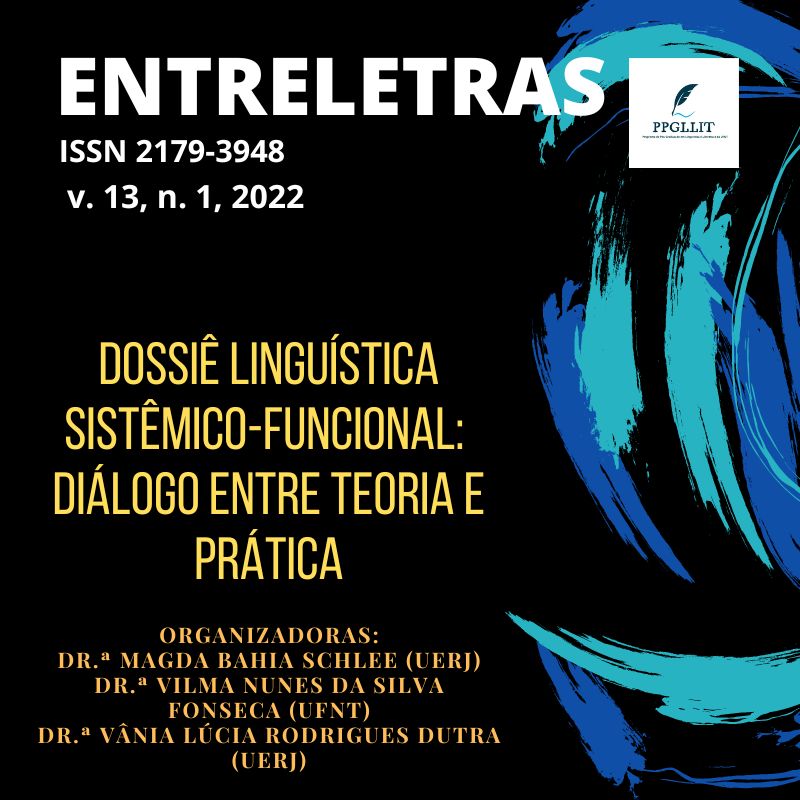ENGLISH TEACHING WITHIN A FUNCTIONAL PERSPECTIVE
A MODEL BASED ON GENRE PEDAGOGY – LERN
DOI:
https://doi.org/10.20873/uft2179-3948.2022v13n1p414-437Keywords:
English teaching; genre pedagogy; multimodalityAbstract
This paper is an excerpt from a thesis developed in the Postgraduate Program in Language Studies at the Federal Center for Technological Education of Minas Gerais. It aims to present the development of a teaching and research proposal based on gender pedagogy. It was supported by a functional perspective of language use. And also, It was considered that other modes of meaning need to be presented in the classroom, not just the verbal one. It is supported by the principle that all text is multimodal (Kress, 2010), that is, formed by more than one semiotic mode. As a methodology, participatory research was used. Data were collected through questionnaires, interviews and field notes. As a result, it was noticed that the focus of the activity was beyond teaching the language as a structure and allowed the development of other students' skills and knowledge. Difficulties were overcome and teach based on textual genres enables the use of language in real communication context.
Downloads
References
AHN, H. Teaching writing skills based on a genre approach to L2 primary school students: an action research. Melbourne. English Language Teaching Vol. 5, No. 2; February 2012, pp.2-16.
ARAÚJO, J.; LEFFA, V. Redes sociais e ensino de línguas: o que temos de aprender? São Paulo: Parábola, 2016.
BAKHTIN, M. Estética da criação verbal. Os gêneros textuais. São Paulo: Martins Fontes, 1997.
BOCCIA, C. et al. Working with texts in the EFL classroom. Mendonza: Ediunc, 2013.
BORTONI-RICARDO, S. M. O professor pesquisador: introdução à pesquisa qualitativa. São Paulo: Parábola, 2008.
BRANDÃO, C. R. (2006) A pesquisa participante e a participação da pesquisa: um olhar entre tempos e espaços a partir da América Latina. In: BRANDÃO, C. R.; STRECK, D. R. (Eds). Pesquisa participante: a partilha do saber. São Paulo: Ideias & Letras, 2006, pp. 17-54.
BRASIL. Ministério da Educação. Secretaria de Educação Básica. Orientações curriculares nacionais para o ensino médio. Linguagens, Códigos e suas Tecnologias. Brasília: Ministério da Educação, Secretaria de Educação Básica, 2006.
BROWETT, J. Critical Literacy and visual texts: windows on culture. impact, Launceston, v. 11, n. 2, p. 24-29, 2002.
COPE, B.; KALANTZIS, M. (1993). Introduction: how a genre approach to literacy can transform the way writing is taught. In: COPE, B.; KALANTZIS, M. (eds.). The powers of literacy: a genre approach to teaching writing. Pittsburg: University of Pittsburg Press, 1993, pp. 1-21.
COPE, B.; KALANTZIS, M; KRESS, G; MARTIN, J. Bibliographical essay: developing the theory and the practice of genre-based literacy. In: COPE, B.; KALANTZIS, M. (ed.). The powers of literacy: a genre approach to teaching writing. Pittsburg: University of Pittsburg Press, 1993, p. 231-247.
COSCARELLI, C. V. Leitura em ambiente multimídia e a produção de inferências. [Tese de Doutorado]. Belo Horizonte, UFMG, 1999.
DIAS, R.; JUCA, L.; FARIA, R. High Up. Ensino médio, vol. 1. Cotia: Macmillan, 2013.
FUZER, C.; CABRAL, S. R. S. Introdução à Gramática Sistêmico-Funcional em Língua Portuguesa. São Paulo: Mercado de Letras, 2014.
HALLIDAY, M. A. K. An introduction to functional grammar. London: Edward Arnold, 1994.
HALLIDAY, M. A. K.; HASAN, R. Language, context, and text: aspects of language in a social-semiotic perspective. Oxford: Oxford University Press, 1989.
HALLIDAY, M. A. K. (1998). El languaje como semiótica social: la interpretación social del lenguaje y del significado. Santafé de Bogotá: Fondo de Cultura Econômica, 1998.
HYLAND, K. Genre pedagogy: language, literacy and L2 writing instruction. Journal of Second Language Writing, Vol. 16, September 2007, p. 148-164,
KALANTZIS, M.; COPE, B. Language education and multiliteracies: introduction: initial development of the multiliteracies’concept. In: MCCARTY, T. L.; STEPHEN, M. (eds.). Encyclopedia of language and education. Language Policy and Political issues in Education. 2nd. ed. vol. 1. London: Springer, 2008, p. 195-211.
KALANTZIS, M.; COPE, B. Literacies. Cambridge (UK): Cambridge University Press, 2012.
KRESS, G. Literacy in the new media age. London; New York: Routledge, 2003.
KRESS, G. Multimodality: a social semiotic approach to contemporary communication. London: Routledge, 2010.
LEFFA, V. Redes sociais: ensinando línguas como antigamente. In: ARAÚJO, J; LEFFA, V. Redes sociais e ensino de línguas: o que temos de aprender? São Paulo: Parábola, 2016, pp. 137-154.
MARTIN, J. R.; ROSE. D. Genre relations: mapping culture. Sheffield (UK): Equinox Publishing, 2007
MATTOS, A. M. A.; VALERIO, K. M. Letramento crítico e ensino comunicativo: lacunas e interseções. RBLA, Belo Horizonte, v. 10, n. 1, p. 135-158, 2010.
SEVERINO. A. J. Metodologia do trabalho científico. São Paulo: Cortez, 2007.
SOUZA. S. A.; CANTUÁRIA. C. L.; SILVA. I. O Ensino híbrido: uma proposta pedagógica para a disciplina de língua inglesa no curso integrado de administração. Língua Tec., Rio Grande do Sul, 2016, vol., 1, n. 2, pp. 100-127.
SOUZA. S. A. Eu aprendi a usar outras ferramentas também: A construção de significados por meio de práticas de leitura e produção de textos multimodais em inglês no ensino médio. [Tese de doutorado]. Belo Horizonte: Centro Federal de Educação Técnica e Tecnológica de Minas Gerais, 2019.
VIAN JÚNIOR, O.; LIMA-LOPES, R. E. A perspectiva teleológica de Martin para a análise dos gêneros textuais. In: MEURER, J. L.; BONINI, A.; MOTA-ROTH, D. (eds.). Gêneros: teorias, métodos, debates. São Paulo: Parábola, 2005, pp. 19-45.
Downloads
Published
How to Cite
Issue
Section
License
Copyright (c) 2022 EntreLetras

This work is licensed under a Creative Commons Attribution 4.0 International License.
Os autores mantêm os direitos autorais e concedem à revista o direito de primeira publicação, com o trabalho simultaneamente licenciado sob a Creative Commons 4.0 que permite o compartilhamento do trabalho com reconhecimento da autoria do trabalho e publicação inicial nesta revista.
Os autores têm autorização para assumir contratos adicionais separadamente, para distribuição não-exclusiva da versão do trabalho publicada nesta revista (ex.: publicar em repositório institucional ou como capítulo de livro), com reconhecimento de autoria e publicação inicial nesta revista.










